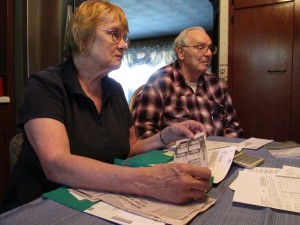Lawmakers divided on whether Chesapeake settlement helps landowners
-
Marie Cusick

Marie Cusick/StateImpact Pennsylvania
Chesapeake leaseholders Janet and Richard Geiger allege the company is cheating them out of royalty payments.
State and local officials disagree on whether a class action settlement agreement with Chesapeake Energy is a good deal for landowners.
Two months after the settlement was reached, the agreement still awaits approval from a federal judge. It could affect more than 1,000 Chesapeake leaseholders.
The lawsuit alleges Chesapeake improperly withheld royalty money by charging landowners for so-called “post production costs” — the expenses involved in processing and transporting gas to market.
While it’s legal for gas companies to take the deductions, this case involves landowners who had negotiated for clauses in their contracts which explicitly prohibit the practice. Chesapeake Energy denies it improperly withheld money, but has called the agreement “fair and reasonable.”
Shortly after the deal was announced, Gov. Corbett issued a statement saying he was pleased with the settlement and had spoken directly with the company’s new CEO, Doug Lawler, about landowners’ concerns.
“I am very appreciative of Mr. Lawler’s personal interest and efforts to resolve this matter,” Corbett said. “While I understand serious issues still remain concerning other landowners affected by royalty payment deductions, the proposed settlement is a significant step forward in protecting the interests of Pennsylvania’s landowners.”
Other elected officials don’t agree.
“It’s not a good settlement,” says Bradford County Commissioner Daryl Miller (R) “If you sign on to this piece of litigation, it gives the gas company the right to take post-production costs out of a lease that would have prohibited it before.”
If the settlement is approved, landowners who participate would receive 55 percent of royalty deductions taken before September 1, 2013.
Going forward, instead of landowners paying 100 percent of the post-production costs, they would instead pay 72.5 percent of these expenses.
The arrangement would be for the life of the lease and bar landowners from pursuing future royalties claims against Chesapeake. Anyone who doesn’t like the terms would need to actively opt-out of the settlement.
The attorneys who negotiated the deal have asked the court to award them one-third of the settlement funds, plus one-third of the future economic benefits (the money landowners get in the future they wouldn’t have received without this agreement) for five years.
“I think people need to be aware of the consequences,” says Rep. Tina Pickett (R-Bradford) “That’s not a very good situation for a landowner to put themselves in. I suggest they get legal advice.”
Rep. Garth Everett (R- Lycoming) says the lawsuit doesn’t solve a more a basic issue about how gas royalties ought to be calculated. He is sponsoring a bill aimed at further defining the law in an attempt to curb the deductions.
“[This lawsuit] just deals with that limited group of people involved,” says Everett. “It doesn’t do anything directly for anybody else.That’s why we need legislation that provides some guidance.”
Despite sending out a press release in August entitled “Yaw Pleased With Settlement of Post-Production Dispute” Sen. Gene Yaw (R- Bradford) admits he is hasn’t read the agreement.
“I haven’t read it and I don’t intend to read it,” he says.
However he agrees with the governor that it is a good first step.
“If you feel you’ve been cheated on a contract, you go to the courts,” says Yaw. “That’s why we have judges.”
















